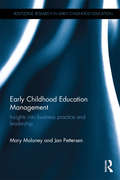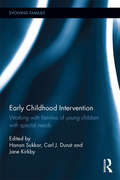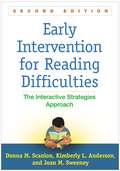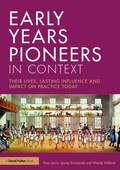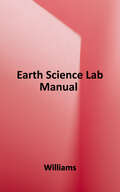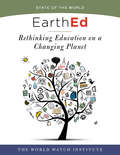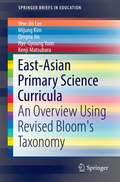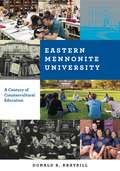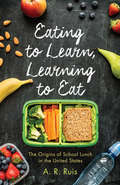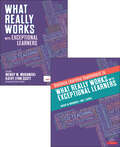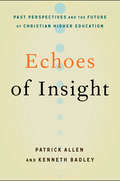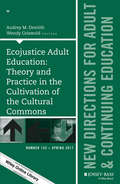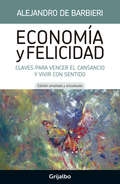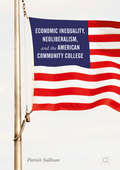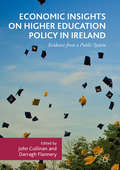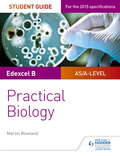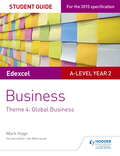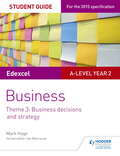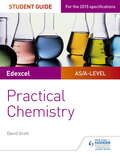- Table View
- List View
Early Childhood Education Management: Insights into business practice and leadership (Routledge Research in Early Childhood Education)
by Mary Moloney Jan PettersenThe Early Childhood Education sector around the world is constantly changing, whether because of the unprecedented demand for ECE services globally, accelerated social change, or the introduction of pedagogical and regulatory practices. Based upon empirical inquiry, Early Childhood Education Management examines the somewhat controversial concept of operating an early childhood service as a business. It challenges the assumption that an early childhood manager does not require specialist knowledge or skill and discusses which attributes an effective manager should possess. In this book, which brings together management theory and practice, Moloney and Pettersen address core issues at the heart of the management role, including the relationship between early childhood policy and broader legislative enactments, as well as issues related to the challenges and development of management skills. The book also draws upon real-life examples from practice in order to offer insight into some of the most common topics and challenges related to management practice in Early Childhood Education, such as business acumen and entrepreneurship, recruitment and selection, financial management and budgeting, supervision, mentoring, staff development, curriculum management, collaborative working, and change management. Written by leading academics with practice experience, the book should be of great interest to researchers, academics and postgraduate students in the field of education, specifically those working in early years and education policy and management. It should also be essential reading for managers working in Early Childhood settings.
Early Childhood Intervention: Working with Families of Young Children with Special Needs (Evolving Families)
by Hanan Sukkar Carl J. Dunst Jane KirkbyEarly childhood is considered a critical but often vulnerable period in a child’s development where early identification and intervention can be crucial for improving children’s developmental outcomes. Systems and family-centred perspectives are vital to support families and build their capacities to lead normalized lives with improved family quality of life. This book explores the family-centred practices and systems factors which influence families’ experiences raising children with complex needs. It also considers the ways in which professionals can work with families to build and support parent and child competence. Conceptual and practical work from Australia, Canada, Europe and the United States present descriptions of and implications for different family system frameworks and early-childhood programs. Contributors in this edited volume bring together contemporary information that bridges the research to practice gap in supporting families of young children with disabilities or delays. Chapters include: Early Intervention for Young Children with Developmental Delays: Contributions of the Developmental Systems Approach Family Composition and Family Needs in Australia: What Makes a Family? Working with Families in Early Childhood Intervention: Family-Centred Practices in an Individualised Funding Landscape Family Systems and Family-Centred Intervention Practices in Portugal and Spain: Iberian Reflections on Early Childhood Intervention This book will attract the attention scholars of Parenting and Families; Child Development and Childcare.
Early Intervention for Reading Difficulties: The Interactive Strategies Approach
by Donna Scanlon Kimberly Anderson Joan SweeneyGrounded in a strong evidence base, this indispensable practitioner guide and text has given thousands of teachers tools to support the literacy growth of beginning and struggling readers in grades K-2. The interactive strategies approach (ISA) is organized around core instructional goals related to enhancing word learning and comprehension of text. The book provides guidance for assessment and instruction in whole-class, small-group, and one-to-one settings, using the curricular materials teachers already have.
Early Years Pioneers in Context: Their lives, lasting influence and impact on practice today
by Pam Jarvis Wendy Holland Louise SwiniarskiThis accessible text provides an international study of critical educational leaders who established the foundation for Early Childhood Education across continents in the 19th and early 20th centuries. It places each pioneer within the time and culture in which they lived to help the reader understand how theories and knowledge about early years education and care have evolved over time. Early Years Pioneers in Context traces key themes such as play, child-initiated learning, working with parents, scaffolding children’s learning and the environment, enabling students to reflect on the differences and similarities between the pioneers and understand their contribution to practice today. Pioneers covered include: Frederick Froebel; Elizabeth Peabody; Susan Blow; Rudolf Steiner; Margaret McMillan; Maria Montessori Susan Isaacs; Loris Malaguzzi. Featuring student integration tasks to help the reader link key ideas to their own practice, this will be essential reading for early years students on undergraduate and postgraduate degree courses.
Earth Science Laboratory Manual
by Harry Williams Kent McGregor Ken Iles George Maxey Lisa Nagaoka Alexandra Ponette-GonzalezThis Earth Science Laboratory Manual is meant to supplement and reinforce lecture material by giving you an opportunity to apply what you learn in class through hands-on activities. <p><p>The exercises illustrate some of the fundamental principles of earth science using a mixture of hypothetical data sets, data from scientific publications and data collected locally from the North Texas region. The exercises emphasize a hands-on, quantitative approach, supplemented by a web-based virtual field trips and CD-ROM exercises.
EarthEd: Rethinking Education on a Changing Planet (State of the World)
by The Worldwatch InstituteEarth education is traditionally confined to specific topics: ecoliteracy, outdoor education, environmental science. But in the coming century, on track to be the warmest in human history, every aspect of human life will be affected by our changing planet. Emerging diseases, food shortages, drought, and waterlogged cities are just some of the unprecedented challenges that today's students will face. How do we prepare 9.5 billion people for life in the Anthropocene, to thrive in this uncharted and more chaotic future?Answers are being developed in universities, preschools, professional schools, and even prisons around the world. In the latest volume of State of the World, a diverse group of education experts share innovative approaches to teaching and learning in a new era. Topics include systems thinking for kids; the importance of play in early education; social emotional learning; comprehensive sexuality education; indigenous knowledge; sustainable business; medical training to treat the whole person; teaching law in the Anthropocene; and more.EarthEd addresses schooling at all levels of development, from preschool to professional. Its lessons can inform teachers, policy makers, school administrators, community leaders, parents, and students alike. And its vision will inspire anyone who wants to prepare students not only for the storms ahead but to become the next generation of sustainability leaders.
East-Asian Primary Science Curricula
by Yew-Jin Lee Mijung Kim Qingna Jin Hye-Gyoung Yoon Kenji MatsubaraThis book describes a comparative study of the primary science learning objectives (from the cognitive domain) in the curriculum of six high-achieving East Asian states -- mainland China, Hong Kong, Taiwan, Korea, Japan and Singapore. Specifically, the authors use one of the most widely accepted and useful tools in curriculum research -- revised Bloom's Taxonomy. This is the first time that such findings from all six states have been published in one place and the results are valuable for policymakers, educators and researchers around the globe. Our new English translations of the primary science learning objectives in China, Taiwan and Korea will also greatly facilitate future analyses of these curricula.
Eastern Mennonite University: A Century of Countercultural Education
by Donald B. KraybillIn this unique educational history, Donald B. Kraybill traces the sociocultural transformation of Eastern Mennonite University from a fledgling separatist school founded by white, rural, Germanic Mennonites into a world-engaged institution populated by many faith traditions, cultures, and nationalities.The founding of Eastern Mennonite School, later Eastern Mennonite University, in 1917 came at a pivotal time for the Mennonite community. Industrialization and scientific discovery were rapidly changing the world, and the increasing availability of secular education offered tempting alternatives that threatened the Mennonite way of life. In response, the Eastern Mennonites founded a school that would “uphold the principles of plainness and simplicity,” where youth could learn the Bible and develop skills that would help advance the church. In the latter half of the twentieth century, the university’s identity evolved from separatism to social engagement in the face of churning moral tides and accelerating technology. EMU now defines its mission in terms of service, peacebuilding, and community.Comprehensive and well told by a leading scholar of Anabaptist and Pietist studies, this social history of Eastern Mennonite University reveals how the school has mediated modernity while remaining consistently Mennonite. A must-have for anyone affiliated with EMU, it will appeal especially to sociologists and historians of Anabaptist and Pietist studies and higher education.
Eastern Mennonite University: A Century of Countercultural Education
by Donald B. KraybillIn this unique educational history, Donald B. Kraybill traces the sociocultural transformation of Eastern Mennonite University from a fledgling separatist school founded by white, rural, Germanic Mennonites into a world-engaged institution populated by many faith traditions, cultures, and nationalities.The founding of Eastern Mennonite School, later Eastern Mennonite University, in 1917 came at a pivotal time for the Mennonite community. Industrialization and scientific discovery were rapidly changing the world, and the increasing availability of secular education offered tempting alternatives that threatened the Mennonite way of life. In response, the Eastern Mennonites founded a school that would “uphold the principles of plainness and simplicity,” where youth could learn the Bible and develop skills that would help advance the church. In the latter half of the twentieth century, the university’s identity evolved from separatism to social engagement in the face of churning moral tides and accelerating technology. EMU now defines its mission in terms of service, peacebuilding, and community.Comprehensive and well told by a leading scholar of Anabaptist and Pietist studies, this social history of Eastern Mennonite University reveals how the school has mediated modernity while remaining consistently Mennonite. A must-have for anyone affiliated with EMU, it will appeal especially to sociologists and historians of Anabaptist and Pietist studies and higher education.
Easy Electronics
by Charles PlattThis is the simplest, quickest, least technical, most affordable introduction to basic electronics. No tools are necessary--not even a screwdriver. Easy Electronics should satisfy anyone who has felt frustrated by entry-level books that are not as clear and simple as they are supposed to be.Brilliantly clear graphics will take you step by step through 12 basic projects, none of which should take more than half an hour. Using alligator clips to connect components, you see and hear immediateresults. The hands-on approach is fun and intriguing, especially for family members exploring the projects together.The 12 experiments will introduce you to switches, resistors, capacitors, transistors, phototransistors, LEDs, audio transducers, and a silicon chip. You'll even learn how to read schematics by comparing them with the circuits that you build.No prior knowledge is required, and no math is involved. You learn by seeing, hearing, and touching. By the end of Experiment 12, you may be eager to move on to a more detailed book. Easy Electronics will function perfectly as a prequel to the same author's bestseller, Make: Electronics.All the components listed in the book are inexpensive and readily available from online sellers. A very affordable kit has been developed in conjunction with the book to eliminate the chore of shopping for separate parts. A QR code inside the book will take you to the vendor's web site. Concepts include: Transistor as a switch or an amplifier; Phototransistor to function as an alarm; Capacitor to store and release electricity; Transducer to create sounds from a timer; Resistor codes; A miniature light bulb to display voltage; The inner workings of a switch; Using batteries and resistors in series and parallel; Creating sounds by the pressure of your finger; Making a matchbox that beeps when you touch it; And more. Grab your copy and start experimenting!
Eating to Learn, Learning to Eat: The Origins of School Lunch in the United States
by Andrew R. RuisIn Eating to Learn, Learning to Eat, historian A. R. Ruis explores the origins of American school meal initiatives to explain why it was (and, to some extent, has continued to be) so difficult to establish meal programs that satisfy the often competing interests of children, parents, schools, health authorities, politicians, and the food industry. Through careful studies of several key contexts and detailed analysis of the policies and politics that governed the creation of school meal programs, Ruis demonstrates how the early history of school meal program development helps us understand contemporary debates over changes to school lunch policies.
EBUNDLE: What Really Works With Exceptional Learners + Distance Learning Supplement
by Wendy Weichel Murawski Kathy Lynn Gandhi Amy I. GainesAuthors Wendy Murawski and Amy Gaines have created this supplement to the bestselling What Really Works With Exceptional Learners to respond to the need for information on best practices for students with special needs in distance, hybrid, and remote learning settings. Packed with practical strategies, research, and tried-and-true advice, this supplement provides educators with resources that will help their students not only learn, but also thrive. This supplement offers current research related to topic such as inclusive practices, specially designed instruction (SDI), social-emotional learning, teacher burnout, UDL, collaborating with co-teachers, and communicating with parents. The authors then highlight actions to avoid and actions to embrace. Call-out boxes identify key concepts, ways to implement technology, and where to find additional information in other chapters of What Really Works with Exceptional Learners. Tables and templates help readers quickly learn and utilize additional strategies. Additional resources and references are also offered for those who would like to go deeper.
Echoes of Insight: Past Perspectives and the Future of Christian Higher Education
by Kenneth Badley Patrick AllenChristian higher education needs something richer and deeper.Faith-based institutions yearn for more than business as usual, and Echoes of Insight invites you to listen again to older, forgotten, and perhaps even ignored voices. Designed to stimulate conversation among colleagues, Echoes of Insight offers brief summaries of several thought-provoking writers from the last century and encourages a new, vigorous conversation about Christian higher education.Alfred North WhiteheadJohn Henry NewmanDorothy SayersAbraham FlexnerHannah ArendtThorstein VeblenFlannery O’ConnorJosé Ortega y GassetMaria MontessoriRobert Maynard HutchinsKarl Jaspers
Ecojustice Adult Education: New Directions for Adult and Continuing Education, Number 153 (J-B ACE Single Issue Adult & Continuing Education)
by Audrey M. Dentith Wendy GriswoldAs ecological issues increase and concern worldwide is mounting about the changing nature of work and cultural life, the field of adult education must respond. Adult education holds much potential for its ability to highlight cultural knowledge, promote change, and maximize the capacity of adults to work together in strengthening mutually supportive communities that contribute to a sustainable future. It is imperative that we (re)educate adults about productive but sustainable work and stronger local community living within an understanding of the relational being and the interdependency of all things. This edited collection explores the cultural roots of the ecological/cultural crisis and its relationship to adult education. The development of sound practices and new cultural understandings among adults are emphasized. Certainly, there exists evidence of small grassroots work that builds hope and skills for the coming of a new age of sustainable and just life.This volume discusses the: Connections between sustainability, environmental and ecojustice education, Forms of radical sustainability adult education, Established cultural institutions as potential agents of change, Principles of ecojustice education, and Implementation of these principles in formal and community education settings. This is the 153rd volume of the Jossey Bass series New Directions for Adult and Continuing Education. Noted for its depth of coverage, it explores issues of common interest to instructors, administrators, counselors, and policymakers in a broad range of education settings, such as colleges and universities, extension programs, businesses, libraries, and museums.
Economía y felicidad: Claves para vencer el cansancio y vivir con sentido
by Alejandro De BarbieriReferencias a la vida cotidiana; situaciones concretas, películas, libros# marcan un estilo ágil y profundo #al que nos tiene acostumbrados el psicólogo y comunicador Alejandro De Barbieri# que hacen de este libro un mapa para la comprensión y acción tanto en nuestra vida individual como en los colectivos en que estamos involucrados. Esta edición ampliada y corregida traerá una nueva introducción, más tips, y dos columnas más. En esta edición ampliada y actualizada de Economía y felicidad. Claves para vencer el cansancio y vivir con sentido, las referencias a la vida cotidiana; situaciones concretas, películas, libros#marcan un estilo ágil y profundo #al que nos tiene acostumbrados el psicólogo y comunicador Alejandro de Barbieri# que hacen de este libro un mapa para la comprensión y acción tanto en nuestra vida individual como en los colectivos en que estamos involucrados. El lector podrá encontrar #palabras preñadas de sentido, palabras que celebran con fundamentos la importancia de vivir y que orientan, con firmeza y con afecto, con rigurosidad y empatía, a caminar la vida por la senda central, sin dejarse tentar por atajos y cortadas que, al cabo, lejos de llevarnos a un punto de comprensión y valoración de la propia existencia, conducirán al filo del vacío#. #No elegimos ser felices, elegimos vivir responsablemente, es decir, respondiendo con acciones a las preguntas que la vida nos plantea a cada momento con situaciones. Somos responsables de nuestras acciones e inacciones, de nuestras palabras y nuestros silencios y de los efectos que todo eso produce en los otros, en el mundo que habitamos y compartimos, y de cómo respondemos a tales efectos. La suma y combinación de esas respuestas da como resultado momentos felices#, afirma en el prólogo el exitoso escritor argentino Sergio Sinay. Detenernos en estas experiencias y reflexiones, escritas en forma amena, ha de ser, sin dudas, una tarea grata y constructiva para todos.
Economic Inequality, Neoliberalism, and the American Community College
by Patrick SullivanThis book aims to deepen public understanding of the community college and to challenge our longstanding reliance on a deficit model for defining this important, powerful, and transformative institution. Featuring a unique combination of data and research, Sullivan seeks to help redefine, update, and reshape public perception about community colleges. This book gives serious attention to student voices, and includes narratives written by community college students about their experiences attending college at an open admissions institution. Sullivan examines the history of the modern community college and the economic model that is driving much of the current discussion in higher education today. Sullivan argues that the community college has done much to promote social justice and economic equality in America since the founding of the modern community college in 1947 by the Truman Commission.
Economic Insights on Higher Education Policy in Ireland
by John Cullinan Darragh FlanneryThis book brings together research relating to the economics of higher education in Ireland and presents evidence that will help support policy decision making. It provides an analysis of prominent issues within the higher education sector from an economic viewpoint, discussing the relevant theory and offering an empirical analysis. The book examines three broad themes with a specific focus on issues related to undergraduate education: participation and preferences, progression and outcomes, and benefits and financing. Each chapter presents an accessible, non-specialist analysis of the topic of interest, making it relevant to a wider audience. In doing so, the book provides an important addition to our current knowledge and understanding of higher education in Ireland from an economic perspective. Key chapters discuss the factors influencing institution choices, student retention in higher education, and policy debates surrounding student finance. The book will serve as a useful and up-to-date resource for policymakers, researchers, academics and students across a range of disciplines, both in Ireland and internationally.
Economics class 8 - Karnataka Board: ಅರ್ಥಶಾಸ್ತ್ರ 8 ನೇ ತರಗತಿ - ಕರ್ನಾಟಕ ಮಂಡಳಿ
by Karanataka patya pustaka sanghaIts an 8th standard economics text book for kannada medium
Edexcel A-level Biology Student Guide: Practical Biology
by Dan FoulderEnsure your students get to grips with the core practicals and develop the skills needed to succeed with an in-depth assessment-driven approach that builds and reinforces understanding; clear summaries of practical work with sample questions and answers help to improve exam technique in order to achieve higher grades.Written by experienced teacher Martin Rowland, this Student Guide for practical Biology:- Help students easily identify what they need to know with a concise summary of required practical work examined in the A-level specifications.- Consolidate understanding of practical work, methodology, mathematical and other skills out of the laboratory with exam tips and knowledge check questions, with answers in the back of the book.- Provide plenty of opportunities for students to improve exam technique with sample answers, examiners tips and exam-style questions. - Offer support beyond the Student books with coverage of methodologies and generic practical skills not focused on in the textbooks.
Edexcel A-level Biology Student Guide: Practical Biology
by Dan FoulderExam Board: EdexcelLevel: AS/A-levelSubject: BiologyFirst Teaching: September 2015First Exam: June 2016Ensure your students get to grips with the core practicals and develop the skills needed to succeed with an in-depth assessment-driven approach that builds and reinforces understanding; clear summaries of practical work with sample questions and answers help to improve exam technique in order to achieve higher grades.Written by experienced teacher Martin Rowland, this Student Guide for practical Biology:- Help students easily identify what they need to know with a concise summary of required practical work examined in the A-level specifications.- Consolidate understanding of practical work, methodology, mathematical and other skills out of the laboratory with exam tips and knowledge check questions, with answers in the back of the book.- Provide plenty of opportunities for students to improve exam technique with sample answers, examiners tips and exam-style questions. - Offer support beyond the Student books with coverage of methodologies and generic practical skills not focused on in the textbooks.
Edexcel A-level Business Student Guide: Global Business
by Mark HageReinforce your understanding throughout the course. Clear topic summaries with sample questions and answers will help you improve your exam technique to achieve higher grades.Written by experienced teacher and examiner Mark Hage this Student Guide for Business:-Identifies the key content you need to know with a concise summary of topics examined in the A-level specifications-Enables you to measure your understanding with exam tips and knowledge check questions, with answers at the end of the guide-Helps you to improve your exam technique with sample answers to exam-style questions-Develops your independent learning skills with content you can use for further study and research
Edexcel A-level Business Student Guide: Business decisions and strategy
by Mark HageReinforce your understanding throughout the course. Clear topic summaries with sample questions and answers will help you improve your exam technique to achieve higher grades.Written by experienced teacher and examiner Mark Hage this Student Guide for Business:-Identifies the key content you need to know with a concise summary of topics examined in the A-level specifications-Enables you to measure your understanding with exam tips and knowledge check questions, with answers at the end of the guide-Helps you to improve your exam technique with sample answers to exam-style questions-Develops your independent learning skills with content you can use for further study and research
Edexcel A-level Business Student Guide: Theme 3: Business decisions and strategy
by Mark HageExam Board: EdexcelLevel: AS/A-levelSubject: BusinessWritten by experienced author Mark Hage, this Student Guide for Business focuses on the key topics of business objectives and strategy, growth and managing change. The first section, Content Guidance, summarises content needed for the exams, with knowledge-check questions throughout. The second section, Questions and Answers, provides samples of different questions and student answers with examples of how many marks are available for each question. Students can:- Identify key content for the exams with our concise summary of topics- Find out what examiners are looking for with our Questions and Answers section- Test their knowledge with rapid-fire questions and answers - Avoid common pitfalls with clear definitions and exam tips throughout- Reinforce their learning with bullet-list summaries at the end of each section
Edexcel A-level Business Student Guide: Theme 4: Global Business
by Mark HageExam Board: EdexcelLevel: AS/A-levelSubject: BusinessWritten by experienced author Mark Hage, this Student Guide for Business focuses on the key topics of globalisation, global business and international trade. The first section, Content Guidance, summarises content needed for the exams, with knowledge-check questions throughout. The second section, Questions and Answers, provides samples of different questions and student answers with examples of how many marks are available for each question. Students can:- Identify key content for the exams with our concise summary of topics- Find out what examiners are looking for with our Questions and Answers section- Test their knowledge with rapid-fire questions and answers - Avoid common pitfalls with clear definitions and exam tips throughout- Reinforce their learning with bullet-list summaries at the end of each section
Edexcel A-level Chemistry Student Guide: Practical Chemistry
by David ScottExam Board: EdexcelLevel: A-levelSubject: ChemistryFirst Teaching: September 2015First Exam: September 2017Ensure your students get to grips with the core practicals and develop the skills needed to succeed with an in-depth assessment-driven approach that builds and reinforces understanding; clear summaries of practical work with sample questions and answers help to improve exam technique in order to achieve higher grades.Written by experienced teacher and author David Scott, this Student Guide for practical Chemistry:- Help students easily identify what they need to know with a concise summary of required practical work examined in the A-level specifications.- Consolidate understanding of practical work, methodology, mathematical and other skills out of the laboratory with exam tips and knowledge check questions, with answers in the back of the book.- Provide plenty of opportunities for students to improve exam technique with sample answers, examiners tips and exam-style questions. - Offer support beyond the Student books with coverage of methodologies and generic practical skills not focused on in the textbooks.
